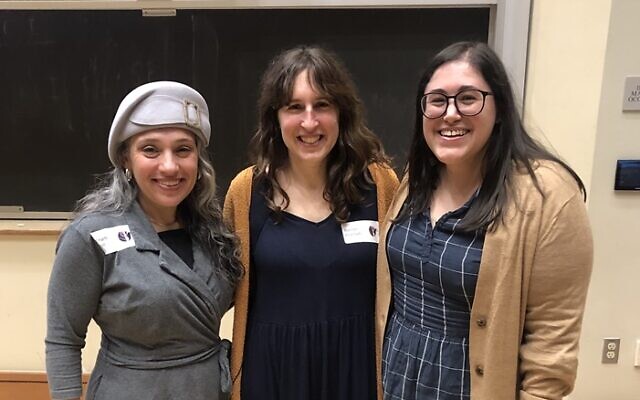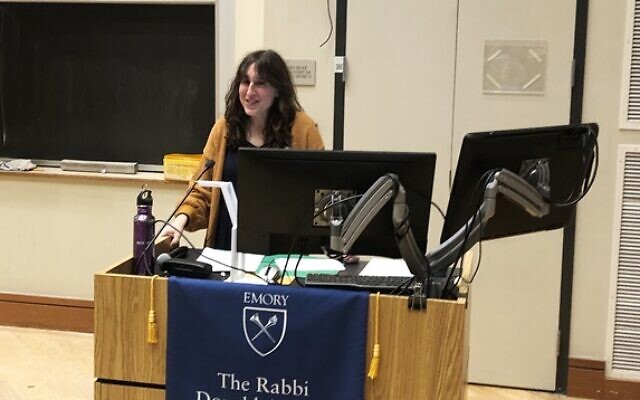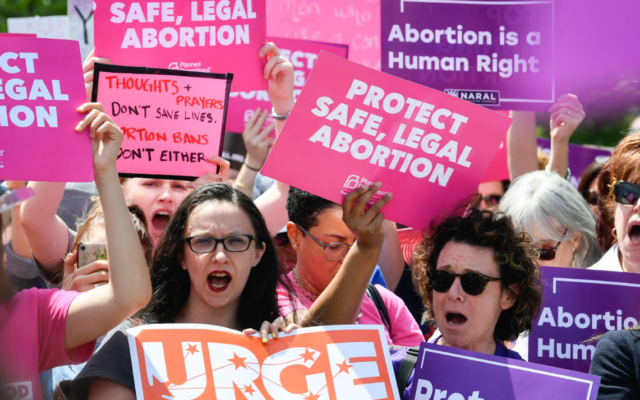Rothschild Lecture Focuses on Abortion Rights Tactics
Visiting scholar, Rachel Kranson, sees a renewed emphasis on abortion as a as a political and legal religious right.

This year’s Rothschild Lecture at Emory University on Nov. 9 dealt with the legal question of abortion and current efforts to ground abortion law in the free exercise of religion in America.
The guest lecturer, Rachel Kranson, who is a historian and director of the Jewish Studies program at the University of Pittsburgh, chose as her topic, “Religious Misconceptions: American Jews, the First Amendment and the Politics of Abortion.”
She believes that Jews may have a good opportunity to challenge the ban on abortion on new Constitutional grounds. She contends that prohibiting abortion violates both the freedom of religious expression and the separation of church and state enshrined in the First Amendment to the Constitution.

Kranson’s lecture, which was given under the sponsorship of Emory’s Tam Institute for Jewish Studies, described that the Jewish approach to abortion is quite different than that of fundamentalist Christianity. To speak of a Judeo-Christian belief in restricting abortion on the grounds that it sanctions the murder of the unborn is a distortion of Jewish principles.
Judaism has long held the belief, she says, that the mother’s life, in both a physical and psychological sense, is primary. That contradicts the rhetoric that is sometimes heard about the bond between most Jews and fundamentalist Christians on the issue.
“There is no single Judeo-Christian tradition on this issue,” she told her Emory audience, “and in fact, there is no single Christian tradition on abortion. Anyone who makes this claim is speaking out of ignorance.”
She turned to the Mishna, the early codification of Jewish law that was written in the first and second centuries of the Common Era. It absolutely prioritizes the life of a pregnant woman over the life of her fetus. Kranson cited the Mishna Oholot 7.6 says that a person must end a pregnancy if it threatens the life of the mother.
The pregnancy must be aborted even if that threat to the life of the mother, be it physical or psychological, occurs just before the moment a fetus enters the world as a human baby.
This long held belief was incorporated in the large body of legal commentaries in the Babylonian Talmud. They have been revived in recent months to challenge the Supreme Court’s decision and highly restrictive laws in a number of states. Jews are increasingly making the case that abortion is a religious obligation, when necessary, that is beyond the reach of the law and the courts.
The argument was first made by lawyers for the World Jewish Congress in the 1970s and 1980s when they became concerned, according to this year’s Rothschild lecturer, about the abuse of power by a Christian majority in this country,
“They understood that in American law, religion most often meant Christianity, and so they believed that any religious influence in American law would result not in shared power and religious pluralism, but rather in coercive forms of Christianity.”
Kranson’s lecture is one part of a program at the Tam Institute for the last year-and-a-half to look at Jewish life through the lens of gender and reproduction.

During Dr. Kranson’s visit to Emory, the Institute organized two days of discussions that looked at the new reality of American life that restricts abortion in some states, like Georgia and allows it in others.
The discussions took on new meaning in light of the decision by voters in Ohio last week to make the right to an abortion a guarantee written into the state’s constitution.
Kate Rosenblatt, who joined the Emory Jewish studies faculty three years ago, believes that Jewish advocates of abortion rights might have some success linking their cause to the issue of religious freedom. Rosenblatt believes that the calls for an expanded definition of religious rights might also play a role in the abortion issue.
“American Jews are looking around at conservative Christian legal tactics, namely the Pursuit of Religious Freedom Restoration Act and the expansive protections that come with them and saying maybe there’s a strategic way to leverage these immensely successful conservative Christian arguments that have been mobilized in service of expanded protections for the right to abortion.”
Professor Kranson is working on a new book entitled, “Religious Misconceptions.” It’s about the history of American Jews and the politics of abortion. The recent emphasis on abortion as a religious right is a distinct shift by liberal American Jews, according to Kranson, who have resisted attempts “to bring religion into the secular public sphere,” as she termed it.
“But to gain leverage on the abortion issue, they insisted that American law ought to accommodate Jewish religious traditions that permitted abortion. And they began to insist on their rights as religious citizens.”
- News
- Local
- Bob Bahr
- Rothschild Lecture at Emory University
- Rachel Kranson
- University of Pittsburgh
- First Amendment to the Constitution
- Emory’s Tam Institute for Jewish Studies
- Abortion
- Reproductive rights
- Mishna
- Babylonian Talmud
- World Jewish Congress
- Kate Rosenblatt
- Pursuit of Religious Freedom Restoration Act



comments